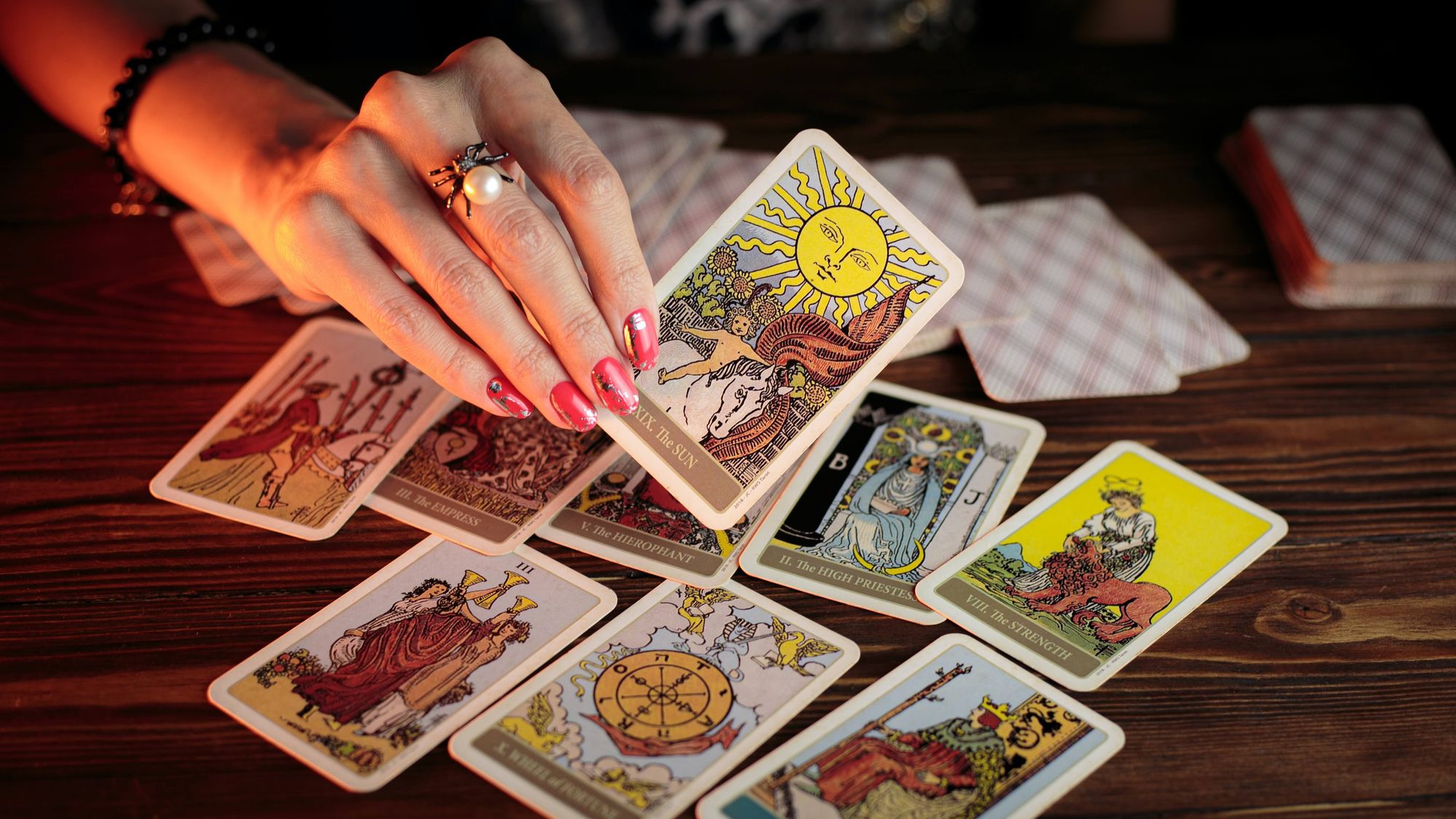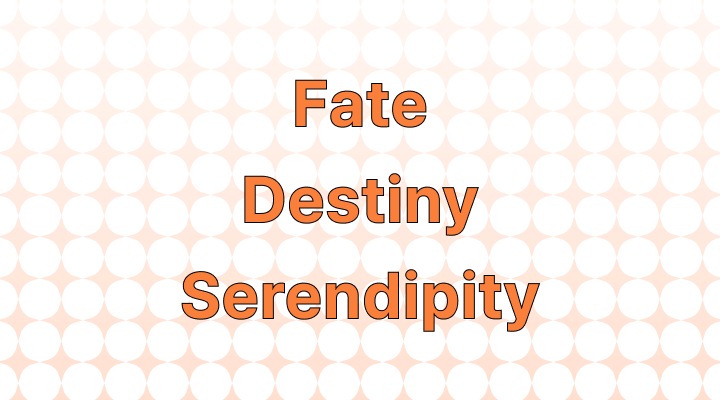- "Fate" refers to the development of events beyond a person's control, regarded as determined by a supernatural power.
- "Destiny" refers to a predetermined course of events considered to be beyond human control.
- "Serendipity" refers to the occurrence and development of events by chance in a happy or beneficial way.
I believe in fate, but I also make my own choices." (Fate + your choices)
My dream is to become a musician. That's my destiny." (Destiny + your goal)
Meeting my best friend was pure serendipity! We clicked instantly." (Serendipity + unexpected connection)
In an article published by the Washington Post, an analyst for YouGov states that approximately 52% of Americans believe in fate, while only 29% express disbelief in the concept. Though this study, we can see that the concept of fate is important to people as 52% is more than the majority. With this statistics, how can we not divulge into the topic of fate vs. destiny vs. serendipity.
🖊️ How to Use "What Happened to" vs. "What Happened With" in a Sentence
🖊️ Serendipity Meaning and Examples
Similarities
- All three influence our lives, though in different ways.
- They inject mystery and intrigue into our narratives.
- They can motivate us and push us to explore new possibilities.
Differences
- Fate: Beyond our control, preordained.
- Destiny: A goal to strive for, achievable through choices.
- Serendipity: Unexpected yet delightful, opens new paths.
So, how do these terms relate with each other?
Fate sets the stage. It throws the dice for our birth, family, and perhaps even defining moments. Yet, within that stage, we dance. We make choices, forge relationships, and build our own stories.
Destiny guides the compass. It paints a picture of who we can become, what we can achieve. But the paths we take to reach that potential are ours to choose. We can climb treacherous cliffs or take scenic detours, each step shaping our journey differently.
Serendipity sprinkles delight. It peppers our path with unexpected connections, lucky breaks, and serendipitous moments that redefine our course. We can chase it actively, like explorers seeking hidden trails, or embrace it with open arms when it knocks on our door.

Let's look at the three terms in more detail:
Fate
Pronunciation: [feɪt]
Part of speech: Noun
Definitions:
- the power or agency supposed to determine the outcome of events before they occur; destiny.
- Example: He believed in a higher power that governed his fate.
- the final outcome, especially one that is considered inevitable or unavoidable.
- Example: It was my fate to be a musician.
- death, destruction, or downfall.
- Example: The soldiers feared meeting their fate on the battlefield.
From Old English "fǣg" meaning "destiny, decree," related to Proto-Germanic "faihuz" meaning "death."
Example sentences of fate
- Despite his meticulous planning, John believed that his fate was ultimately beyond his control.
- Clara felt that meeting her long-lost friend at the airport was a twist of fate.
- The ancient prophecy foretold the hero's fate, predicting a challenging journey filled with triumphs and hardships.
- As the dice rolled, Mark pondered whether his fate in the board game was about to take a turn for the better or worse.
- Anna couldn't escape the feeling that her fate was intertwined with the mysterious events unfolding around her.
Destiny
Pronunciation: [dəˈstɪnɪ]
Part of speech: Noun
Definitions:
- a predetermined course of events; fate.
- Example: The hero knew it was his destiny to defeat the evil dragon.
- a predetermined state or outcome, especially one considered desirable or inevitable.
- Example: She saw it as her destiny to become a doctor and change the world.
- a person's ultimate purpose or goal in life.
- Example: He searched for his destiny, wondering what he was truly meant to do.
From Old French "destinee," from Latin "destinata" (feminine plural), meaning "fixed things, what is determined."
Example sentences of fate
- From a young age, Maya felt a strong sense of destiny, as if her life had a predetermined purpose waiting to unfold.
- Mark believed that his relentless pursuit of knowledge was leading him toward his true destiny as a groundbreaking scientist.
- Despite facing setbacks, Clara remained confident that her true destiny would reveal itself in due time.
- The ancient prophecy spoke of a hero who would rise to fulfill their destiny and bring balance to the world.
- As a child, James often daydreamed about his destiny, envisioning himself as a brave adventurer exploring uncharted lands.
Serendipity
Pronunciation: [sɛrˌɛnˈdɪpɪti]
Part of speech: Noun
Definitions:
- the occurrence and development of events by chance in a happy or beneficial way.
- Example: Finding a winning lottery ticket in a dusty old book was a stroke of serendipity.
- fortunate coincidence.
- Example: Bumping into an old friend while traveling abroad was a serendipitous encounter.
- the faculty of making fortunate discoveries by accident.
- Example: The scientist's serendipitous observation led to a groundbreaking discovery.
Coined by Horace Walpole in 1754, inspired by "The Three Princes of Serendip," a Persian fairy tale where the princes constantly make discoveries through "accidents and sagacity."
Example sentences for serendipity
- Serendipity led Mary to discover a rare, out-of-print book she had been searching for in a dusty secondhand bookstore.
- Jake's decision to attend a random networking event resulted in the serendipitous encounter that eventually led to his dream job.
- During their unplanned road trip, the friends experienced serendipity when they stumbled upon a charming, hidden gem of a café.
- Sarah's chance encounter with an old friend at the airport felt like a serendipitous reunion after years of lost contact.
- The artist's serendipitous discovery of a forgotten sketchbook in the attic inspired a whole new series of creative works.
Remember, understanding these concepts is not about predicting your future. It's about cultivating an awareness of the forces that shape it, celebrating the choices you make, and embracing the beauty of the unforeseen. So, step into the grand play of life, embrace the dance, and let fate, destiny, and serendipity weave their magic into your unique story.
Instructions: Choose the most appropriate word from the box to complete each sentence. Be prepared to discuss your choices and why they are the best fit.
Words: fate, destiny, serendipity
1. I believe in _____ guiding my life, even though I make my own choices. 2. The old fortune teller predicted that my _____ would involve great success.
3. Despite all my planning, it felt like _____ intervened when I met my soulmate.
4. The accident left him paralyzed, changing his _____ in an instant.
5. He worked hard for years, hoping his dedication would determine his own _____.
6. She stumbled upon a job interview while lost in the city, a true stroke of _____.
7. Some people believe their lives are written in the stars, governed by _____.
8. Even the smallest choices can set you on a different _____ path.
9. He lost everything in the fire, feeling like a victim of cruel _____.
10. Finding a winning lottery ticket on the sidewalk was pure _____ at its best.
Answer key:
- destiny (implies a guiding force shaping one's life)
- destiny (suggests a predetermined path and great fortune)
- serendipity (a fortunate coincidence beyond chance)
- fate (unforeseen event impacting his future)
- destiny (his own hard work shaping his outcome)
- serendipity (lucky chance encounter)
- fate (a predetermined life path governed by external forces)
- destiny (a chosen path with potential changes)
- fate (uncontrollable misfortune)
- serendipity (unexpected fortunate discovery)
Remember, these are just suggested answers. The beauty of these concepts lies in their openness to interpretation and individual beliefs. Use this worksheet as a springboard for further discussions and explorations!
Want to sound like a native speaker?
Engram’s AI-powered grammar checker makes your English sound like a native speaker’s, suggesting natural English expressions on top of fixing grammar, spelling, punctuation, word order, and vocabulary.

References:
















